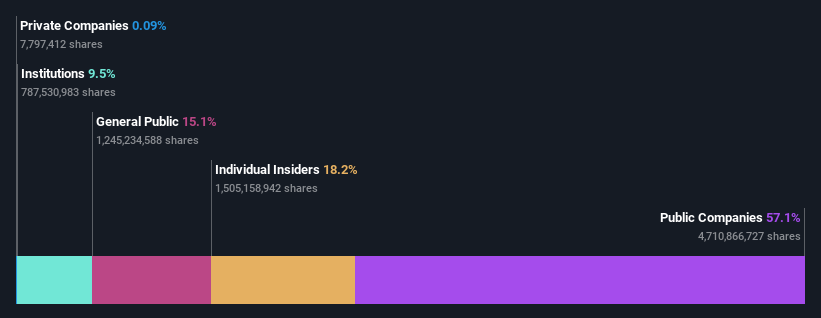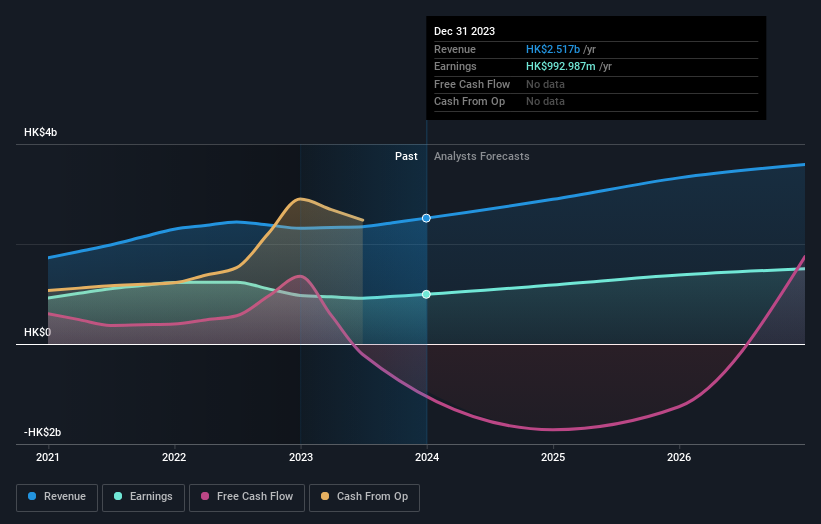Stock Analysis
- Hong Kong
- /
- Renewable Energy
- /
- SEHK:3868
Public companies are Xinyi Energy Holdings Limited's (HKG:3868) biggest owners and were hit after market cap dropped HK$578m

Key Insights
- Xinyi Energy Holdings' significant public companies ownership suggests that the key decisions are influenced by shareholders from the larger public
- The largest shareholder of the company is Xinyi Solar Holdings Limited with a 52% stake
- Insider ownership in Xinyi Energy Holdings is 18%
If you want to know who really controls Xinyi Energy Holdings Limited (HKG:3868), then you'll have to look at the makeup of its share registry. We can see that public companies own the lion's share in the company with 57% ownership. In other words, the group stands to gain the most (or lose the most) from their investment into the company.
While the holdings of public companies took a hit after last week’s 6.3% price drop, insiders with their 18% also suffered.
Let's delve deeper into each type of owner of Xinyi Energy Holdings, beginning with the chart below.
View our latest analysis for Xinyi Energy Holdings

What Does The Institutional Ownership Tell Us About Xinyi Energy Holdings?
Institutional investors commonly compare their own returns to the returns of a commonly followed index. So they generally do consider buying larger companies that are included in the relevant benchmark index.
We can see that Xinyi Energy Holdings does have institutional investors; and they hold a good portion of the company's stock. This implies the analysts working for those institutions have looked at the stock and they like it. But just like anyone else, they could be wrong. If multiple institutions change their view on a stock at the same time, you could see the share price drop fast. It's therefore worth looking at Xinyi Energy Holdings' earnings history below. Of course, the future is what really matters.

Xinyi Energy Holdings is not owned by hedge funds. Looking at our data, we can see that the largest shareholder is Xinyi Solar Holdings Limited with 52% of shares outstanding. With such a huge stake in the ownership, we infer that they have significant control of the future of the company. With 8.6% and 5.8% of the shares outstanding respectively, Yin Yee Lee and Ching Sai Tung are the second and third largest shareholders. Ching Sai Tung, who is the third-largest shareholder, also happens to hold the title of Vice Chairman.
While studying institutional ownership for a company can add value to your research, it is also a good practice to research analyst recommendations to get a deeper understand of a stock's expected performance. Quite a few analysts cover the stock, so you could look into forecast growth quite easily.
Insider Ownership Of Xinyi Energy Holdings
While the precise definition of an insider can be subjective, almost everyone considers board members to be insiders. Company management run the business, but the CEO will answer to the board, even if he or she is a member of it.
I generally consider insider ownership to be a good thing. However, on some occasions it makes it more difficult for other shareholders to hold the board accountable for decisions.
It seems insiders own a significant proportion of Xinyi Energy Holdings Limited. It has a market capitalization of just HK$8.8b, and insiders have HK$1.6b worth of shares in their own names. That's quite significant. It is good to see this level of investment. You can check here to see if those insiders have been buying recently.
General Public Ownership
The general public, who are usually individual investors, hold a 15% stake in Xinyi Energy Holdings. This size of ownership, while considerable, may not be enough to change company policy if the decision is not in sync with other large shareholders.
Public Company Ownership
Public companies currently own 57% of Xinyi Energy Holdings stock. This may be a strategic interest and the two companies may have related business interests. It could be that they have de-merged. This holding is probably worth investigating further.
Next Steps:
It's always worth thinking about the different groups who own shares in a company. But to understand Xinyi Energy Holdings better, we need to consider many other factors. Take risks for example - Xinyi Energy Holdings has 3 warning signs we think you should be aware of.
If you would prefer discover what analysts are predicting in terms of future growth, do not miss this free report on analyst forecasts.
NB: Figures in this article are calculated using data from the last twelve months, which refer to the 12-month period ending on the last date of the month the financial statement is dated. This may not be consistent with full year annual report figures.
Valuation is complex, but we're helping make it simple.
Find out whether Xinyi Energy Holdings is potentially over or undervalued by checking out our comprehensive analysis, which includes fair value estimates, risks and warnings, dividends, insider transactions and financial health.
View the Free AnalysisHave feedback on this article? Concerned about the content? Get in touch with us directly. Alternatively, email editorial-team (at) simplywallst.com.
This article by Simply Wall St is general in nature. We provide commentary based on historical data and analyst forecasts only using an unbiased methodology and our articles are not intended to be financial advice. It does not constitute a recommendation to buy or sell any stock, and does not take account of your objectives, or your financial situation. We aim to bring you long-term focused analysis driven by fundamental data. Note that our analysis may not factor in the latest price-sensitive company announcements or qualitative material. Simply Wall St has no position in any stocks mentioned.

Simply Wall St
About SEHK:3868
Xinyi Energy Holdings
Xinyi Energy Holdings Limited, an investment holding company, owns, operates, and manages solar farms in the People's Republic of China.
Adequate balance sheet with moderate growth potential.
